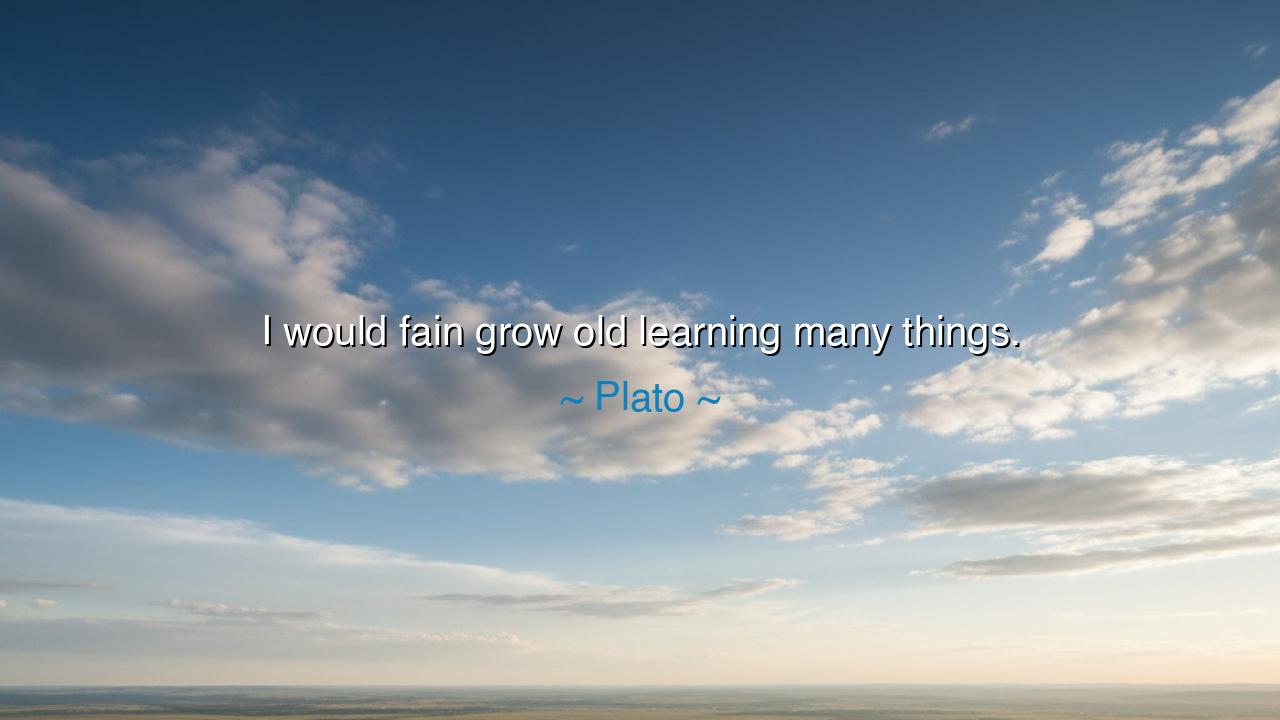
I would fain grow old learning many things.






“I would fain grow old learning many things.” — Plato
In this radiant utterance, Plato, the philosopher of philosophers, reveals the eternal hunger of the human soul — the desire not merely to live long, but to learn long. His words sing of a spirit that refuses to grow dull with age, that hungers still for wisdom as the body bends with time. When Plato says he would “fain grow old learning,” he is not speaking of the gathering of facts, but of the continual awakening of the mind and the heart. For him, learning is not a task but a way of being — the flame that gives meaning to life itself.
The origin of this thought flows from the Greek ideal that education is the cultivation of the soul. In the Academy he founded, Plato taught that the purpose of life was not comfort or power, but the pursuit of truth — a truth that no man could fully grasp, yet toward which every mind must strive. To him, the wise man was not the one who possessed knowledge, but the one who loved wisdom — the philosopher, whose soul remained ever young because it remained ever curious. Thus, to grow old learning is not to resist time, but to triumph over it — for age cannot wither a mind still in pursuit of understanding.
This philosophy stands in noble contrast to the way of those who, having reached a certain point in life, believe they have learned all that matters. Plato’s words gently rebuke such arrogance. The one who ceases to learn, he implies, has ceased to truly live. The world, with all its beauty and mystery, is an endless book, and the wise man reads its pages until his final breath. In this, Plato echoes his own teacher, Socrates, who confessed, “I know that I know nothing.” For in the humility of that statement lies the door to all enlightenment — the recognition that learning is infinite, and that to keep seeking is to keep the soul alive.
Consider the life of Leonardo da Vinci, a man born two millennia after Plato but living wholly in his spirit. Even into old age, Leonardo’s notebooks teemed with sketches and questions: the motion of water, the flight of birds, the geometry of the human body. To him, curiosity was sacred. He studied until the end, lamenting not his failures but the limits of time — that he could not learn more before death. In Leonardo, we see Plato’s dream fulfilled: a soul that grows old, not weary; a mind that remains youthful through its wonder. Such a life is not measured in years, but in the depth of its discoveries.
There is, too, a moral power in Plato’s wisdom. For to keep learning is to remain humble before the vastness of existence. It is to admit that the world is larger than one’s own perspective, and that wisdom is a horizon forever receding as we walk toward it. The proud man closes his mind and becomes stagnant; the learner opens his heart and remains free. Even the simplest lesson — a new skill, a deeper empathy, a clearer understanding of another’s pain — renews the spirit. To grow old learning is to keep becoming, to stay in motion, and to resist the decay of complacency.
And yet, this is no easy path. It demands courage to face the unknown and humility to be a beginner again and again. The learning soul must be willing to stumble, to question, to unlearn and relearn. But this struggle, Plato teaches, is the very purpose of existence. For the mind that ceases to question drifts into darkness, while the one that hungers for truth walks forever in the light. As the seasons of life pass, one’s body may slow, but the mind that seeks wisdom becomes eternal. The elder who still learns carries the fire of youth within.
So, my child, take this teaching to heart: let your curiosity be your companion through every age. Do not fear to begin again, nor believe that your years excuse you from wonder. Learn from the stars and from the soil, from books and from people, from joy and from sorrow alike. Read, listen, observe, and reflect — for all the world is your teacher, if only you remain its student. As Plato wished, so too may you live: not merely to count the days of your life, but to fill them with learning, until your final breath finds you still leaning forward — eager, alive, and forever growing in wisdom.






AAdministratorAdministrator
Welcome, honored guests. Please leave a comment, we will respond soon